- Home
- China Miéville
Looking for Jake: Stories Page 21
Looking for Jake: Stories Read online
Page 21
I saw them come this way, thought Sholl.
He set his foot on the second step down. It made a little noise. He waited, and then continued.
Sholl descended slowly. He brought both feet together on each step, and paused before moving on. He listened to his breath come fast. He was suspended. The steps rose rapidly behind him into darkness. He shone his torch back the way he had come, fearful that he was being followed. He became uneasy about the dark pillar beside him. He imagined that something was hiding behind it, a few steps below him, moving at his pace, keeping just out of his sight. Sholl moved left, until he was touching the shaft’s curving wall, straining himself to see as far down ahead as possible.
He went like that, skirting the wall, lower and lower toward the cold train tunnels, quite cosseted by darkness. His pace lulled him, the slow spiralling descent became hypnotic. There were tiny sounds at the edges of things, as the feral imagos, the little ripped images of hands and eyes and genitals, crawled away from him. Perhaps they were other things, too: the last of the rats or mice, hiding from the predatory reflections.
The light that bobbed from step to step suddenly touched something that moved. The shock of it made Sholl cry out, and flail with the torch as if it were a sword, until its light picked out a face, a line of faces, a mass of them, lips thinned and resolute, eyes distended, and fixed on him.
Soundlessly, the vampires clogged the stairs. He could not count them—twenty at least, in their incongruous clothes, standing still, waiting for him. They watched him as he moved the torch from one face to the other. The constriction of each pair of pupils, in turn, was their only motion.
Sholl breathed fast with his heartbeat. He waited for the vampires to attack him, but they did not come closer. Nothing moved in the shaft for a long time. Finally, Sholl descended one step. The vampires responded in perfect time, like a macabre dance troupe, shifting backward together, staying out of his reach. He came forward again, and they moved back in time with him, and they began to make a sound, a faint humming, an anxious and unpleasant noise.
Anger rose in Sholl. He pointed his gun into the mass, but he did not shoot. He approached them more quickly, and they increased their own pace, their soundtrack becoming louder.
With a sudden lurch, Sholl almost threw himself down the stairs at the human figures, letting his shotgun swing back on its sling. He snatched out so quickly that his hand closed around the lapel of the nearest vampire. The creature screeched and moved away, yanking free of Sholl’s grasp and scuttling past him up the stairs. Sholl’s momentum took him on, and he had to fight to keep his feet, hurtling down, the torchlight swinging from wall to wall, showing the coldly set features of the vampires. Sholl snatched as he ran, and felt cloth and even flesh and bone in his grasp, but again and again it was pulled free.
He swung his shotgun. It clattered against the wall.
Sholl shouted wordlessly, and grabbed desperately for the figures that were scattering, spreading out. They evaded him. He stumbled down the stairs, grabbing for the handrail. He reached the bottom unexpectedly: the floor changed, disrupting his rhythm, and he fell onto the concrete plateau. His torch skidded away from him, its beam random.
From the floor, Sholl craned his neck. Darkness loomed over him, moving forward and backward as the torch rolled. Ranged around Sholl were scores of figures, the vampires, hollowed out by shadows. He bellowed and rose, hurling himself at them, deeper into the tunnels, following a sign that said THIS WAY TO TRAINS.
The vampires surrounded him out of his reach, retreating with him, into the darkness, never touching him, staying beyond his fingertips when he lurched.
Sholl swung his shotgun like a club. He wanted to fire into them, to rain them in bloody bone over each other, but he was afraid that they would scatter, and he needed to reach one, to take one. He screamed in fearful rage, and in frustration.
The torch was a long way behind him now. It was a little point of glimmering at the end of the passage. He walked in pitch and the vampires were as indistinct as ghosts. Sholl ran at them, and they were gone from his hands, glowering from the darkness.
Get out of here, he felt them think. Get out of our house. Leave us alone.
Sholl stamped like a child and screamed again. They would not get close enough to touch. They just stood at the very edges of light and waited for him to go. He raged at them, becoming exhausted, stumbling farther and farther into their dark. He leaned against the walls and felt despair.
Something came out of the silent crowd around him. He heard it approaching, pushing through the immobile vampires. It made a low sound as it came, and Sholl looked up, into the darkness, not with the terror that made sense but with some kind of hope. He stared into nothing as running footsteps echoed toward him.
Like something rising out of murky water, a face became momentarily visible, inches from him. Dirty white in the darkness, crossed with scars. Sholl did not have time to register its expression before he was hit hard, and he flew backward.
He lay dazed in the cold dirt. He knew he needed to get up. The thought was looping in his head that one of them had touched him. It had hurt him yes but it had touched him; it was not staying out of reach. It was what he wanted, and needed. He was excited but afraid again, knowing that he could be killed.
His attacker was circling him. Sholl could hear it. He made a sound like mewing and rolled, trying to stand. He was hit again, the momentum pushing him to the tunnel’s wall.
Adrenaline came through the new pain, and he was standing, arms out to fight. There were noises in the tunnel, of consternation, of whispered bickering. Sholl could hear tugging. Bodies buffeted against one another. Something was passing through the vampires, a concern. At the back of the tunnel, in the purest black, a voice was raised (the reflection of a larynx forced, unhappily, to make human sounds).
With a little harsh bark—not at Sholl but at its companions—the attacker broke free of its crowd. Sholl could see an insinuation of it, a shadow in the darkness. He raised his arms to meet it, and when the cold face emerged up close to him he discovered that he was ready. He swung the shotgun, stock out like a mace. He smacked the face aside.
Sholl was elated. To have touched, to have connected. He swung his gun again, toward the ground where his attacker must have fallen. He wielded the barrel with force that surprised him. He was not conscious of anger, but of focusing on a task.
The vampire that had touched him cried out when Sholl’s makeshift club slammed into its leg. The percussion on the bone was loud. The wounded thing grabbed Sholl’s shin and hauled him, but Sholl was ready again, and he brought himself down on the prone figure.
They tumbled into each other. They rolled in the dust and muck. Sholl grabbed for the imago’s head, careful not to slip his thumbs into the thing’s mouth, but to grip the skull and bring it down, twice, on the concrete. His opponent was punching Sholl in the face, but it did not have the worst of imago strength, or that strength had left it, because the blows connected and they only hurt.
Then Sholl was choking, the vampire pinioned beneath him but reaching up, gripping Sholl’s throat. Sholl heard his own breathing stop. He was hitting his attacker, but not hard enough, and he knew that he was in danger. He heard a faint twittering, like birds, and he was sure it was in his own head.
Terrified of dying, he felt for his shotgun. By the time he had it in his fingers, he was weak. He brought it down on the vampire’s head, and the grip on his throat loosened. The gun bounced from the skull to the floor, and fired down the tunnels.
In the frozen moment of light Sholl saw the faces of the crowd. They loomed over him and his dazed attacker. So far as he could read emotion in those faces, faces that wore human features without facility or empathy, they looked stricken. Discomposed and desperate. Their mouths were open. He realised that the sound like birds was not his imaginings, that they were making it. Trilling and staring down. One or two of them were reaching for him in his fight, but with hover
ing, tentative and crooked-fingered hands, so that he knew they would not bring themselves to touch him, they could not. And then the light was gone, and he was left only the afterimage.
Sholl was strengthened by their anxiety. He dazed the imago beneath him with another brutal blow and stood, rescuing his shotgun, refilling it. Sholl dragged the half-conscious vampire back the way he had come, toward the little light. It began to wake, and he hauled it high enough that it could crawl, and took it around corners until he saw the bottom of the spiral stairs, with the torch at their foot.
The vampires came with him. They followed Sholl and his captive, keeping a few feet away but becoming visible as they turned in to the fringes of torchlight. They kept reaching out with that unconvincing motion, not committing but terrified of this capture that they witnessed, distressed by what they were watching. They moaned.
Sholl locked the vampire’s arms to the banisters before it came to. He used two pairs of cuffs. That would not hold any imago at full strength, Sholl knew, but not all the invaders were so uncannily powerful, and he hoped that this one’s injuries would keep it weak. He beat it twice in the face with his shotgun, watching the blood come up under the skin, and out, with satisfaction.
He shone his torch into the bleary face. The stitchwork of scars marred features that would—with normal feeling animating them—be pleasant enough, Sholl suspected. Beyond the illumination, the other vampires watched anxiously, but they would not come closer.
When the vampire had strengthened a little, its head rolling less, moving with more certainty, Sholl clicked his fingers until he caught its eye, and as it began to snarl and strain against the chains, he put his shotgun to its neck, and pushed hard enough to bruise.
“I don’t know,” he said, “how bad it’ll be for you if I fire.” In the tunnel so far underground, his voice was stark. “I don’t know what’ll happen to you, or how long it’ll take for you to fix.”
He looked carefully at the worm-white face. It moved constantly below the skin, as muscles worked. The vampire strained but the doubled handcuffs held. The other vampires waited.
Nervously, Sholl let his captive try and fail to break free.
“Why did you touch me? Why won’t they touch me?”
He did not like to speak it, as if doing so would break whatever power he had, but in any case the vampire did not reply. Sholl prodded its neck again. He knew he did not have long, and he thought quickly for other tactics. He could not bully this thing into speaking, but perhaps he could make it think that there was no point to its silence.
Even with an enemy so opaque, so alien as the imagos, even with the fog of war, it had been possible to learn a great deal about their campaign. In the early days of the conflict, the vampires had seemed much more like humans. They had lived among humans for years, sometimes centuries, and they had picked up habits. In the first weeks of the war they had often—standing at the head of the incoming force, on some terrible machine, taking stock of the aftermath of a massacre—taunted the defeated armies, had raged about their own oppression, and crowed that it was coming to an end.
As they had passed time back among their own kind, that mimicked behaviour had died, replaced with increasingly incomprehensible actions, without analogue or meaning in human terms. (The vampires had become pathetic. Trapped in the bodies they had loathed for centuries, the imago spies, who had perhaps been key to freeing their kind, could not become themselves. They were stuck, pretend humans and now pretend imagos.) But Sholl had listened very carefully in those early days, and had talked to others who had heard things, sometimes demanding information of them as they died. To his captive audience, now, Sholl showed off what he had learnt.
He told the tethered vampire when and how the imagos had been enslaved, at the hands of a myth, an ancient human thinker-king. He told it how it and its comrades—the vampires who called themselves patchogues, the spies, those-who-cross-over—had been the advance guard. How the unfettered imagos that had at last broken out had become their generals, all answering to one, their forms melting away gradually from anything recognisable to human eyes, as they regained their own dimensions, leaving the patchogues behind.
At the head of them all was their over-power. The military genius who had won the campaign: a champion. The imago they called Lupe, the Fish, or the Tiger. Waiting here, in London, at the heart of the campaign, as its troops finished off the last resistance. Sholl told his captive that too.
The vampire’s face did not change, and neither did any of its fellows’. Sholl had reached the point of his interrogation.
“I have something,” he said. “For the Fish of the Mirror. Where is it?”
Nothing spoke.
“Where is the Fish of the Mirror?”
Sholl punched the barrels of the shotgun hard into the chained patchogue’s temple, making it rock and snarl. When Sholl spoke, though, it was as if he had been conducting a quiet discussion.
“What can I do? You’re not scared of me. None of your siblings are scared of me. Lupe won’t be afraid. What can I do to it? I can’t hurt the Fish of the Mirror, can I? I want to give it a gift. Where is it?
“I want to give it a gift.” His captive stared at him. Sholl was beginning to rage. He hit the vampire in the face repeatedly as he spoke. Each time, its head snapped quickly back and it stared at him full on again, without fear, uncowed. “I want to give it a gift. I’ll fucking give it something. Don’t you want it to have something it can’t fucking forget? A present. Where’s the Fish of the Mirror? Where? I’ll give it something. I have a fucking gift for it, something it can’t refuse. Where is it? Where is the Fish of the Mirror? Where? Where is the Fish of the Mirror? Where is the Fish of the Mirror?”
And suddenly, in a voice that was shockingly human, the captive told him. It took full seconds for Sholl to realise what had happened. He began to smile. Of course.
He had won. The vampire did not believe he could hurt the Fish of the Mirror. What did it matter if he knew where it was? Perhaps it was the vampire’s alien psychology, that made it give in to his taunts, or perhaps it wanted to see what he would do with the information—what betrayal he would attempt, and fail at. It would not believe he had no plan.
But Sholl saw that his captive seemed to have shocked its comrades. The other vampires were twitching nervously, and rolling their heads on their necks like sick dogs. Here and there Sholl heard them howl. He looked up, directly up, watching the black coil of the stairs disappear over his head, hearing the silence and the little drips and scratches of underground sound, and the mouth-noise of the vampires. He became terrified, very suddenly, and when he directed the torchlight into the faces of the things that surrounded him, picked them out one by one and saw them watch him unblinking, their mouths slack or grimacing, he was weak.
“Why don’t they touch me?” he whispered. He hated his plaintive voice. “None of them. No imago in London. And why do you?”
He looked back down at the chained creature below him, and let out a cry as he saw that one patchogue braver than the rest had crept closer, close enough to touch, and that it was reaching out now and grasping the handcuffs. Sholl stepped backward and levelled the shotgun, but he was too slow: the vampire had burst its comrade’s chains and it ululated briefly as it hauled the bloodied captive onto its shoulders and rescued it, loping at ridiculous speed into the dark corridors.
Sholl fired into the shadows, and in the brief hot light he saw the pellets tear open several of the vampires, sending them screaming into one another, but he knew that he had missed his attacker and its rescuer. They had gone much quicker than he could follow, becoming invisible in their siblings and the dark.
The smell of sulphur was rank on him. After their first screech, even the wounded vampires were silent. The ranks closed, and all that had changed was that now the faces closest to his, staring at him, were splashed with their neighbours’ blood.
In the darkness under the earth, Sholl stared at them, an
d waited for them to come at him, but still they did not.
It took Sholl less time to come up than it had to descend. Then he had walked in terror of where he was going—now he wanted passionately to get out.
He took the stairs at a slow jog, stopping every few score feet and taking his breath. Every time, he would turn and look behind him, and even after what he had just seen and done, the ranks of silent faces following him still made his stomach pitch, the blood-messed vampires in their everyday clothes like an honour guard. They kept their distance precisely, wordlessly trailing him, making sure he was going.
They came with him as far as the station’s entrance, gathering just inside the building. They stared at Sholl as he stumbled into the early evening, spreading himself wide as if even that waning light energised him. Behind him the patchogues touched each other nervously now and then, in absentminded social behaviour unlike anything human.
Sholl stood exhausted in the junction beyond the Tube entrance. The imagos did not follow him, and the vermin of mirrors had not returned. The crossroads was empty.
Tottering, Sholl turned back toward the station. He rubbed his face as if just waking, and gazed at the wide-eyed vampires that waited for him finally to go, hating him from the shadows. Sholl was elated. He had gone in and he had come out. He had gone down and come back up, and he had brought with him what he wanted, the knowledge. He knew where he had to go.
He raised his arms like a scarecrow and staggered a few steps back the way he had come, back toward the vampires, running at them as if he were trying to mock-scare a child. They bolted away too fast to see. Sholl rushed them and laughed when they hid, waited a few seconds until one or two heads began to reemerge, then repeated his wild charge, disappearing them again.

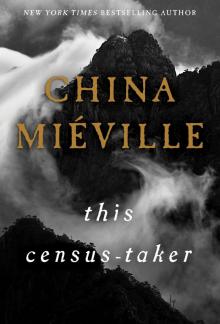 This Census-Taker
This Census-Taker Jack
Jack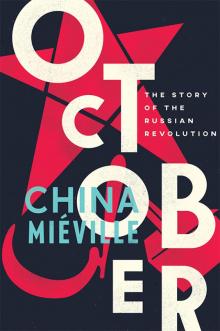 October: The Story of the Russian Revolution
October: The Story of the Russian Revolution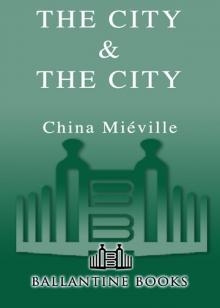 The City & the City
The City & the City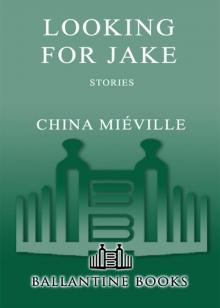 Looking for Jake: Stories
Looking for Jake: Stories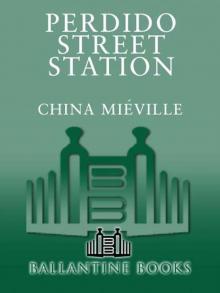 Perdido Street Station
Perdido Street Station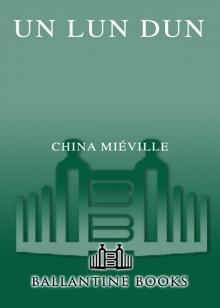 Un Lun Dun
Un Lun Dun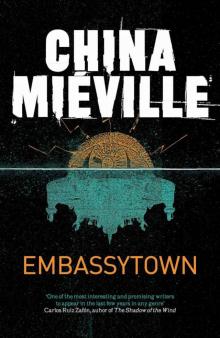 Embassytown
Embassytown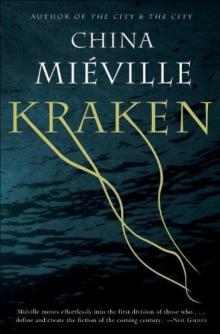 Kraken
Kraken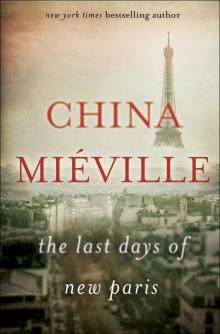 The Last Days of New Paris
The Last Days of New Paris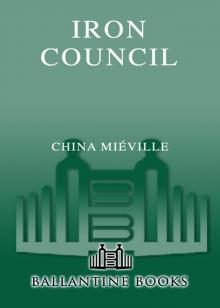 Iron Council
Iron Council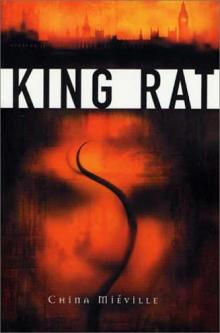 King Rat
King Rat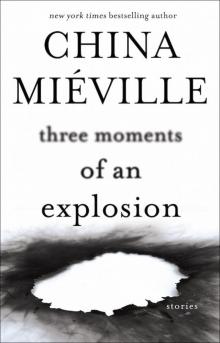 Three Moments of an Explosion
Three Moments of an Explosion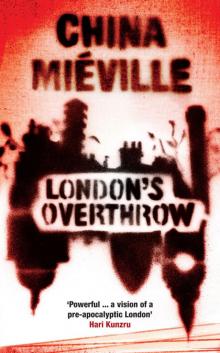 London's Overthrow
London's Overthrow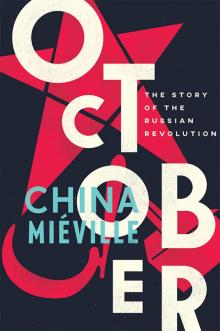 October
October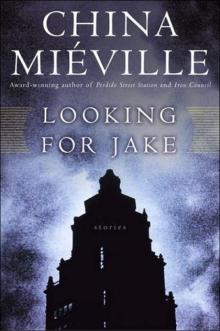 Jack (new crobuzon)
Jack (new crobuzon)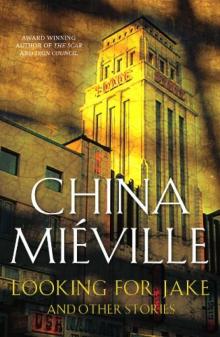 Looking for Jake and Other Stories
Looking for Jake and Other Stories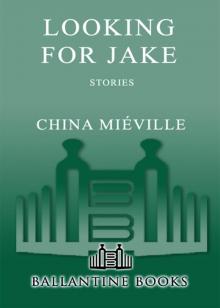 Looking for Jake
Looking for Jake